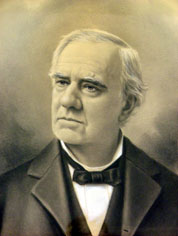Samuel F. Phillips
Samuel Field Phillips (born February 18, 1824 in New York City , † November 18, 1903 in Washington, DC ) was an American lawyer, civil rights activist, politician and United States Solicitor General . He was involved in the fundamental decision of Plessy v. Ferguson of the United States Supreme Court .
Life
Samuel F. Phillips was born in New York to mathematician James Phillips. Two years after he was born, his father became the first professor of mathematics at the newly formed University of North Carolina at Chapel Hill , and the family moved to Chapel Hill . He later attended the university where his father taught as a student and received his master's degree in law in 1844. After studying Phillips initially worked as a lawyer until 1852 he was the first time for the Whig Party in the Parliament of North Carolina ( North Carolina General Assembly did choose). From 1854 to 1859 he taught at the law school at Chapel Hill University.
As a politician, he was an opponent of secession in the American Civil War , participated in the first Reconstruction conference and campaigned for the civil rights of the Afro-American population. Eventually he joined the Republican Party , after which he was often referred to as Scalawag . For about five years, Phillips returned to practice as a lawyer. He and his family moved to Raleigh , where he served as a court stenographer for the state's Supreme Court.
In 1871 he took up another term in the North Carolina House of Representatives . In November of the following year, he was named second Solicitor General of the United States by US President Ulysses S. Grant . He held this office for over twelve years. It was not until May 1885 that he was replaced by John Goode . In 1872 he moved to Washington for the purpose of executing his office.
In 1896 he defended Homer Plessy in the famous Plessy v. Ferguson . He described the principle of separate but equal as nothing more than a denigration of African Americans because of their skin color. As a solicitor general, he campaigned, among other things, to maintain the conviction against several members of the Ku Klux Klan who had attacked a black man who wanted to take part in the congressional elections.
Around 1900 Phillips retired from professional practice. He died in Washington three years later. His remains are buried in Chapel Hill.
Web links
- Biography on docsouth.unc.edu (English)
- Biography on www.justice.go (English)
| personal data | |
|---|---|
| SURNAME | Phillips, Samuel F. |
| ALTERNATIVE NAMES | Phillips, Samuel Field (full name) |
| BRIEF DESCRIPTION | American lawyer, civil rights activist, politician, and solicitor general |
| DATE OF BIRTH | February 18, 1824 |
| PLACE OF BIRTH | New York City |
| DATE OF DEATH | November 18, 1903 |
| Place of death | Washington, DC |


